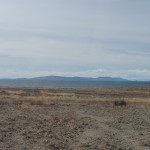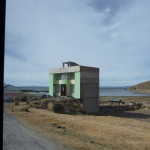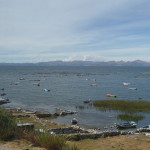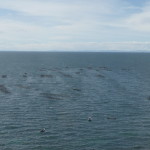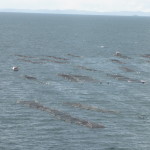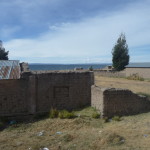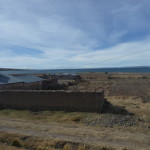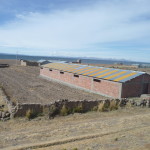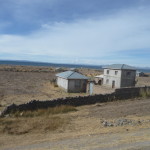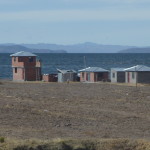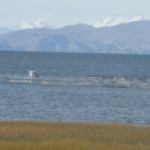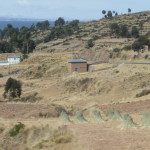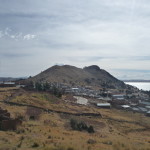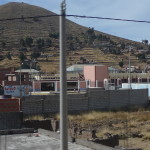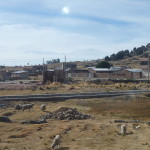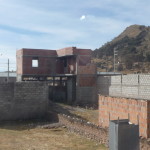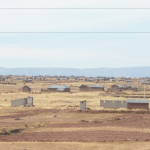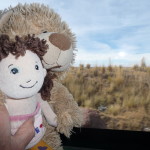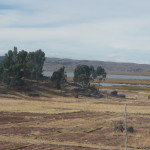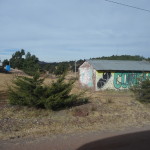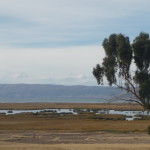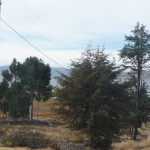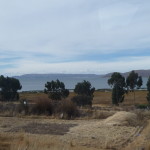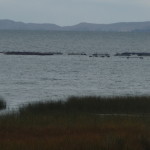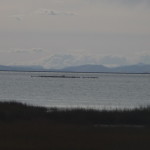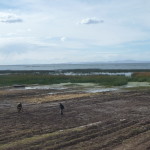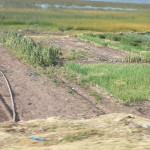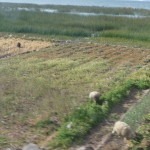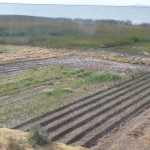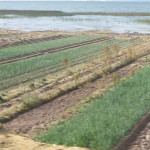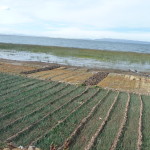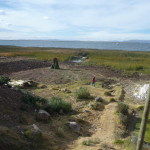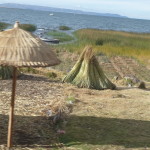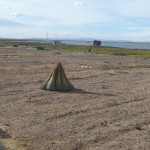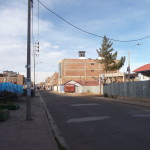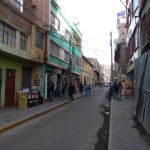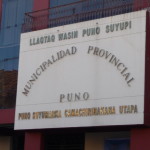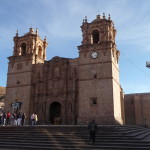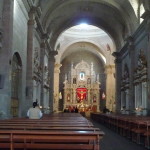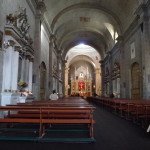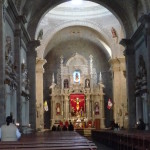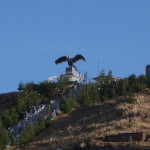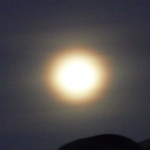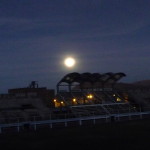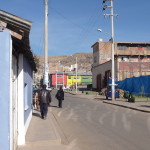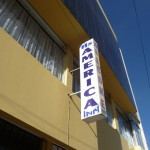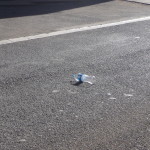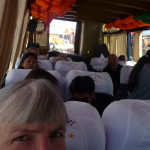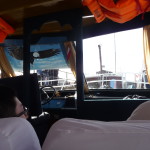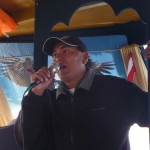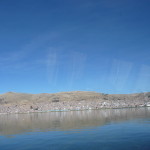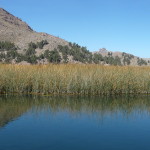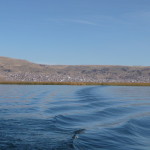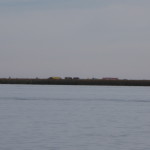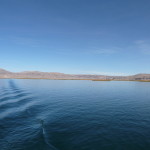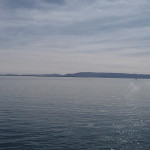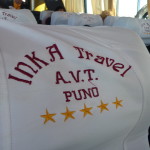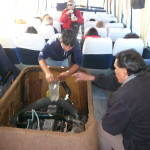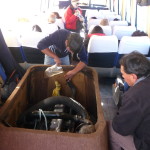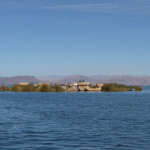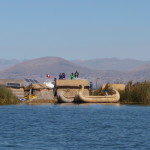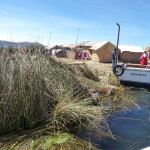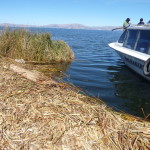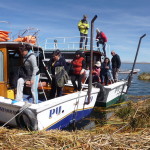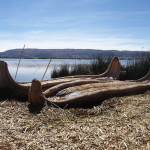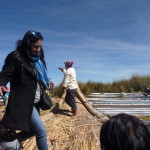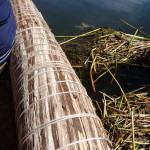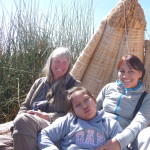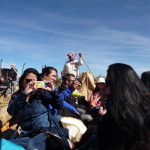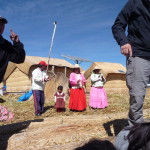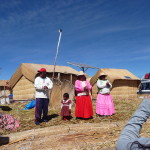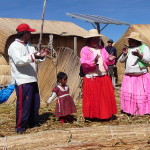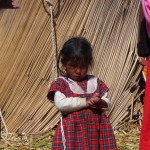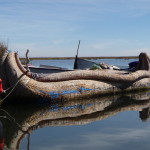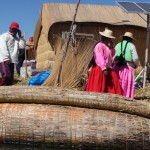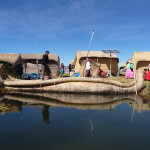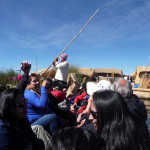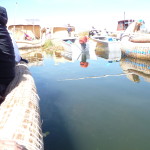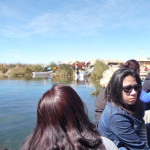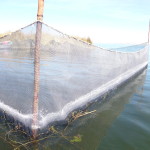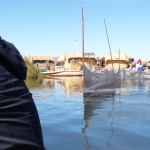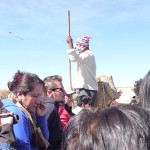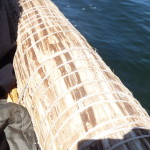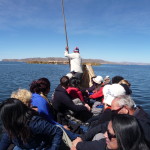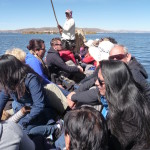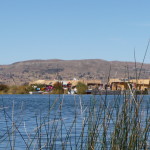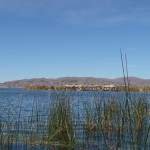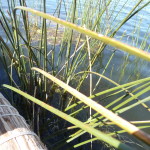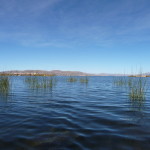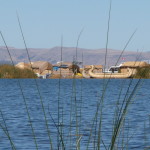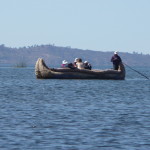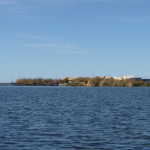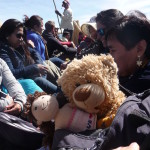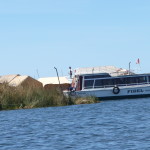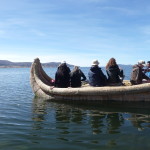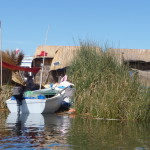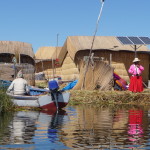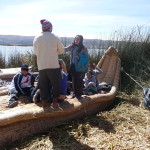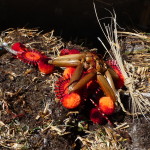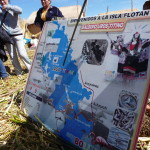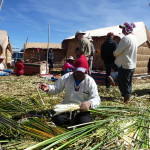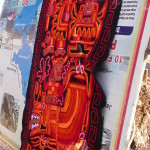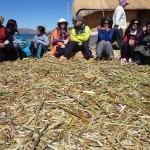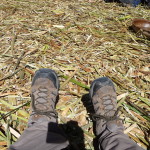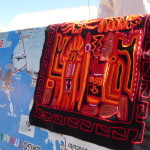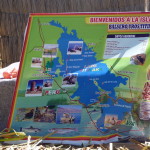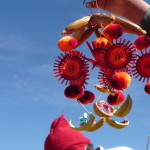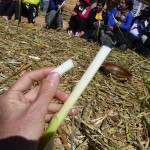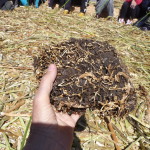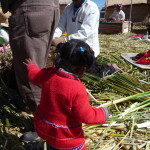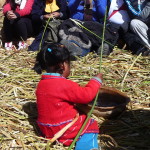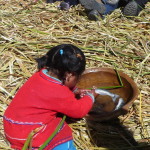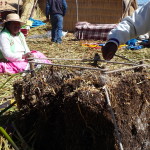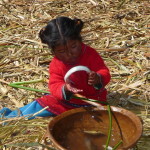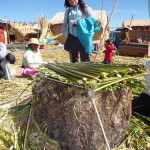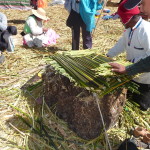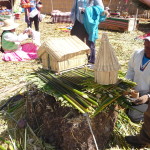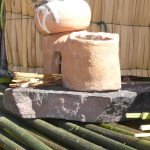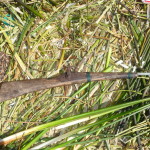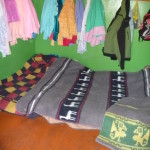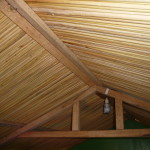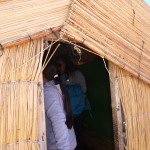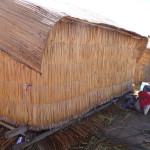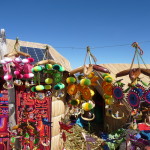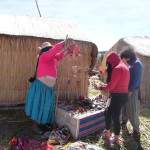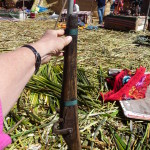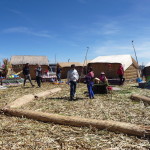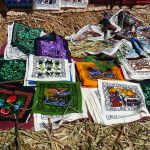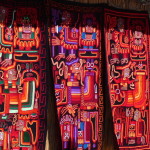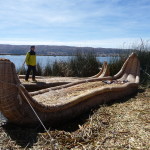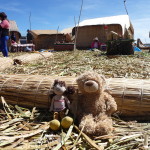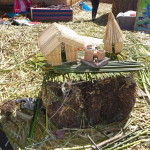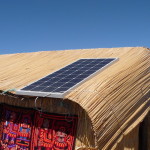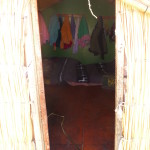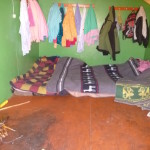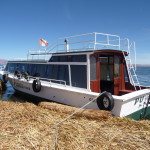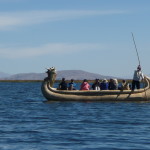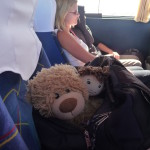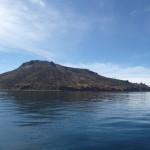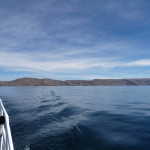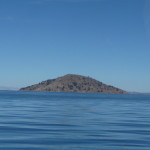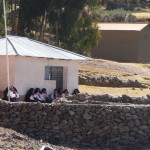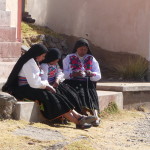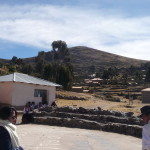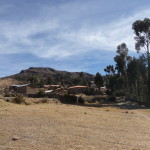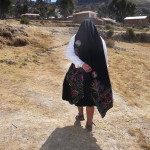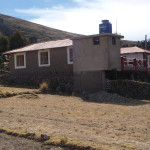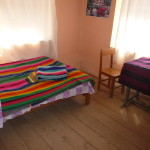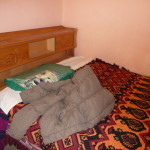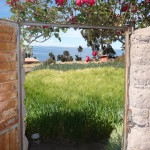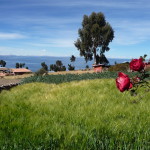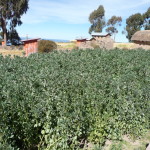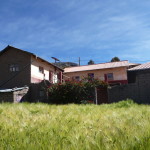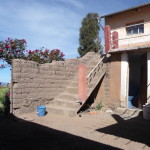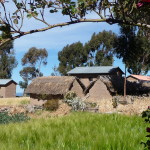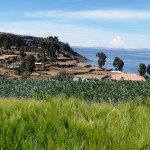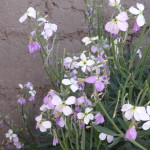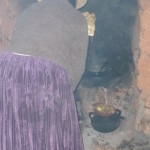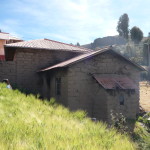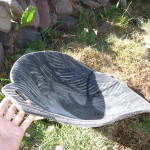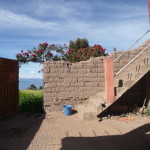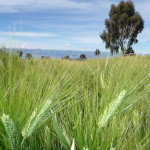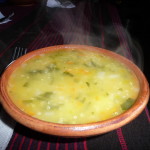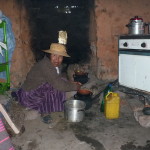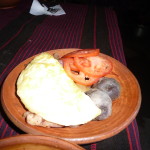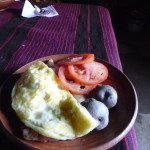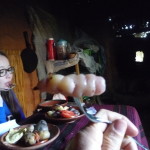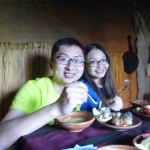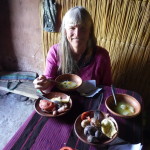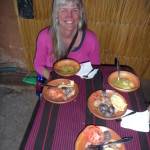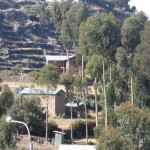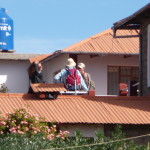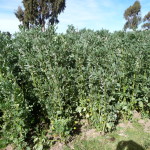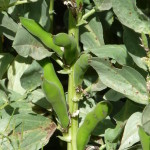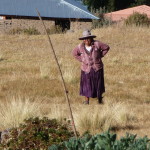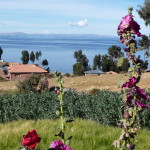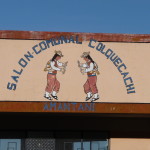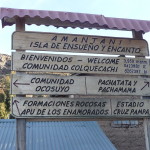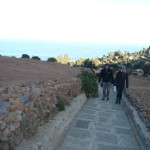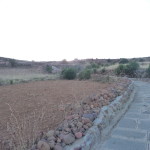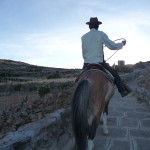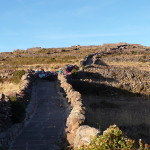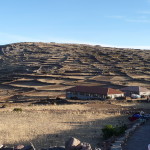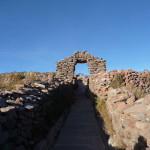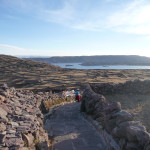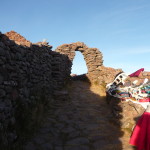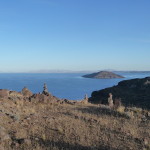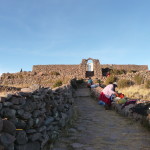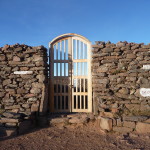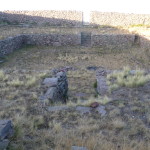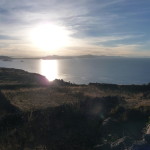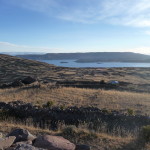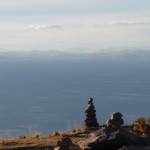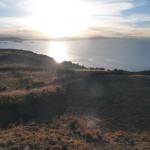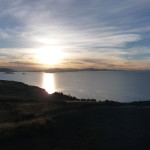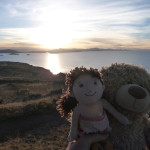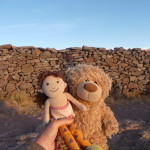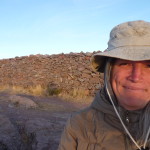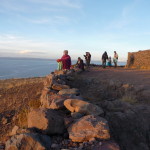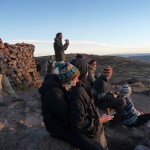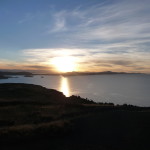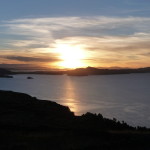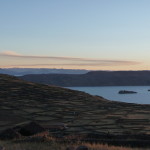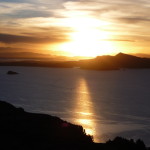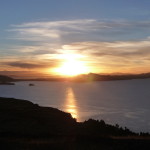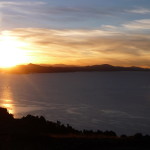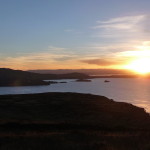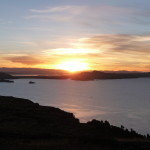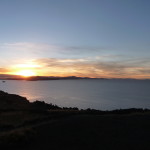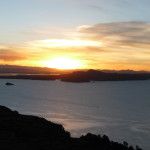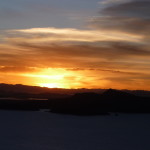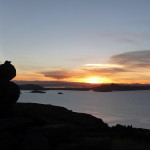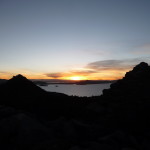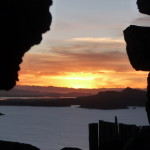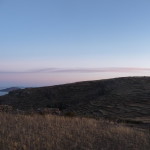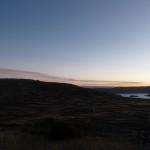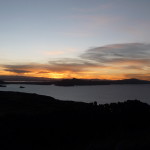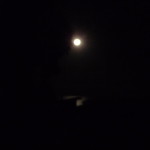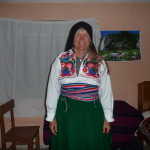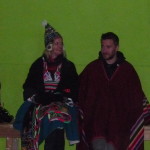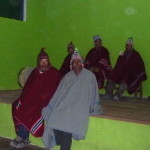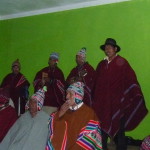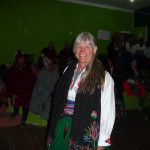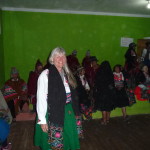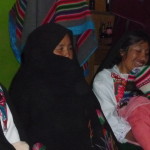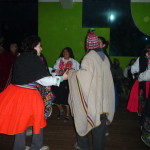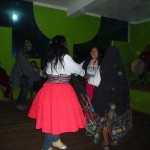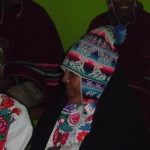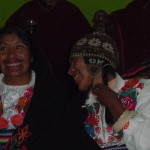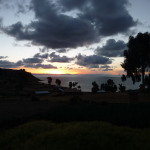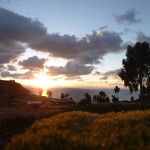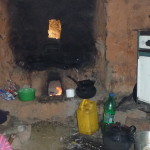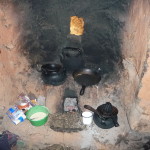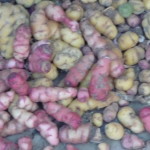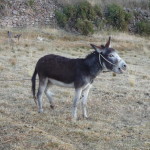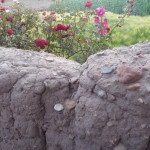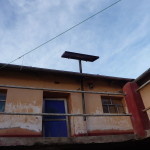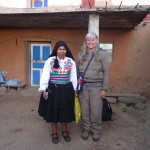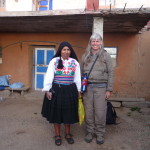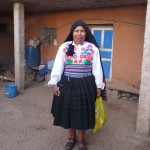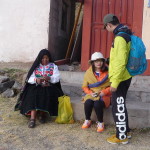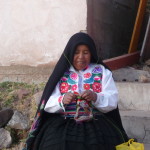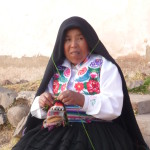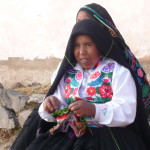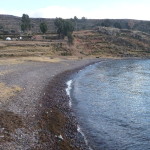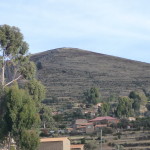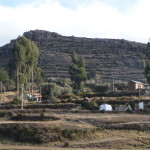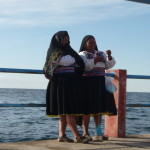This post contains 248 photos, including detailed narratives. It covers parts of three days, June 12-14, 2014.
In the early afternoon on Thursday, June 12, 2014, I catch a bus from Copacabana, Bolivia, back to the Peruvian border crossing, and then on toward Puno, Peru. The first 36 photos highlight that trip, and the next 10 photos cover a little bit of Puno.
Early on Friday, June 13, I embark on a two-day (overnight) tour of some of the northern islands of Lake Titicaca (on the Peruvian side). The next 93 photos cover my journey to, and at, one of the floating islands of the Uros people. Then, the next 92 photos cover the first part of my overnight stay at the home of an indigenous woman on Amantani Island. The final 19 photos of this blog cover the morning of day two (June 14), as I say goodbye to that beautiful Amantani island. The remainder of that trip will be documented in the next blog.
As usual, the photos in this post are thumbnail images. Please click on any photo to enlarge it. The thumbnails leave much to be desired as far as colors and resolution – plus the thumbnails clip all of the edges. I use thumbnails for the post itself, because it gives people an opportunity to get a summary glimpse without downloading huge amounts of data for the high-res photos.
CLICK ON ANY PHOTO TO ENLARGE TO HIGH RESOLUTION
Copacabana, Bolivia To Puno, Peru
I arrive early, at 1:00 p.m., to board my bus in Copacabana. It is an older double-level bus. While it is not new, it is very nice and quite inexpensive. I sit on the upper level with great views of the lake to my right.
Our first stop is the border between Bolivia and Peru. I sail right through my exit from the Bolivia side. When I arrive at the Peru immigration office, I first stop, briefly meditate and breathe, and then step through the door. I have been pondering this moment since mid April. I would love to remain in Peru for a longer time, but that possibility remains in the hands of the Universe … and whatever border guard helps me.
I hand my passport to the uniformed officer and, as he scans it on the computer and begins to look at past stamps inside, I tell him that I am a writer, and that I am here writing about my experiences in Peru.
“I really need another six months to give me time to complete my writing,” I tell the border official, with a huge smile on my face.
“You have already been her for a long time,” he responds, looking up at me and then back at my passport.
He speaks again after a short pause.
“How about 150 days?” He asks me with a smile.
“That would be perfect,” I respond with a glowing grin.
Soon, I walk away from the immigration office with permission to stay at least five more months in Peru. So many possibilities have just opened.
After crossing the border and going around the southern tip of this part of Lake Titicaca, I look out the window to the right. With a full zoom on my camera lens, I am able to capture this final glimpse of the “Island of the Sun” off in the distance.
A funny old building along the road.
I am deeply curious about those funny things far out in the water. It looks like little fenced-off sections. I wonder if perhaps the people are growing fish or other edible water foods …
All you can see above the water are a few feet of what appears to be netting or perhaps chain-link fencing. I can only imagine what is below. I never do ask anyone, and still do not know to this day.
A better photo (the best I could get) of these mysterious cages.
Just some of the scenery along the way.
Lots of adobe construction.
And the occasional building like this one, made of clay blocks.
More typical housing, with the lake in the background.
As this photo illustrates, most homes are very basic, without much fancy architecture.
More of those fenced off areas in the lake (very blurry because of the moving bus).
A hillside with the lake in the background.
Another similar photo, with a different hill.
Driving through a small community.
… with sheep grazing freely.
Construction everywhere …
Spread out farmland with little houses dotting the landscape.
Bobby and Brenda enjoying the scenery, looking out the bus window.
There are lots of farms on this side of the road … but not a lot of visible green.
Just as it was in Peru, most political signs are painted on the sides of buildings. This particular emblem is common – some type of political party that uses a rubber sandal as their logo.
At times the shoreline is filled with reeds and marshy areas.
And yes, there are some trees. There seem to be a lot of Eucalyptus trees in the area.
A little farm with trees and lake in the distance.
More of those funny water cages in the lake.
I just did a quick search on the internet, and I found one site that talks about cage farming in Lake Titicaca. So I am guessing these are fish cages, where they raise fish, like a fish farm out in the water.
A couple of farmers in a lakeside field.
There are actually fresh vegetables growing here (not sure what they are).
More lakeside fields, with a few sheep wandering around.
Just below the road, with the lake on the other side.
Growing lots of stuff here…
… and there is plenty of water available. It is hard to remember that the lake itself is at 12,507 feet above sea level … and nighttime temperatures in June and July can drop well below freezing.
Another common site. That funny teepee like thing in the middle of the field is a bunch of reeds gathered together, standing vertically. These reeds have edible parts, and are used for many things.
More of the reeds in a teepee-like pile.
And another one …
Puno, Peru
Soon, we drive through the streets of Puno and stop at the “terminal terrestre” (the ground transportation terminal). On board the bus with us is a travel agent, selling tours and promoting a small hospedaje. He pays for my taxi cab to check out the hospedaje … and I decide to stay there. It is really nice with economical rates … called the “America Inn”.
This is a side view of the “America Inn” in the center distance. It doesn’t look like much on the outside, but is very nice on the inside.
The walk from the hotel to the Plaza De Armas is only about four blocks. This is part of the street that I follow.
The sign on the municipal building in the town square.
The church in the Plaza De Armas.
Inside the church…
With full zoom, taken from the Plaza De Armas. I want to see what that funny thing is up on the hill. With the zoom, it looks like a Condor.
That night, I look out my hotel window, and see the gorgeous full moon.
There is a little sports field below my window. The moon is just rising above the small stadium seating area.
The Uros Floating Islands
I am embarrassed to admit it. For as long as I can remember, I have heard accounts about the floating islands in Lake Titicaca … and for whatever reason, I have always had the impression that the “Island of the Sun” and the “Island of the Moon” were two of those floating islands.
I was actually quite surprised to learn that the Island of the Sun (and the Moon) were instead, actual islands with hills and rocks … and they are definitely NOT floating.
Earlier on Thursday afternoon, before the travel agent left the hotel, I decided to purchase a two-day (overnight) to tour that, on the first day, would take me to a floating island.
In the process, I learn that there is an indigenous group called “The Uros” which has lived on these islands for a very long time. For the most part, many of these Uros are maintaining the traditions of their ancestors.
A few of the islands welcome tourism to supplement their income.
At 8:13 a.m. on Friday morning, June 13, 2014, a van full of tourists finally stops in front of my hotel to pick me up. The extra large van is nearly full, and soon it does fill up as we retrieve the last few people at their respective hotels. Soon, we arrive at the marina and board our tour boat for the next two days.
This is a photo I take while patiently waiting for the van to arrive, wondering if I might have been forgotten.
And another photo of the sign on my hotel … also taken while waiting.
Still while waiting, a garbage truck stops in front and collects the hotel’s garbage. I am absolutely shocked when the person running the back of the truck finds two large plastic bottles mixed in with the trash. Appearing to be disgusted, he picks the bottles out of the trash and throws them back out onto the street, where they start to roll away into the gutter.
I can only imagine why. Maybe there is a recycling law here, where plastic bottles are not supposed to be placed in the normal refuse bins. But I do find it surprising that he would just toss the bottles back out of the garbage and onto the street.
Me on the tour boat. There are around twenty of us. It is quite comfy. The windows are clean and the inner cabin is warm. Occasionally, I go out on top.
Looking from my seat up toward the front of the boat. The captain sits up there on the left.
This will be my home for much of the next two days.
In addition to our captain, we also have a full-time guide. He speaks both Spanish and English – but his English is sometimes hard to understand. His name is Giovani. (Our captain/driver’s name is Armando).
A photo of Puno in the distance. We are already quite far from shore.
Reeds are everywhere along the shores …
Puno is situated in a large bay, and the only way out is via a man-made channel cut through the reeds.
It is not visible in this thumbnail image, but on the full-size photo, you can see a red tower on the left, marking the entrance to this man-made channel.
It is hard to see in this photo, but behind that wall of reeds (far edge of lake) is a reserve area, and if you look closely you can see some structures sticking up above the reeds. Those structures are on some of the floating islands that are closer to Puno.
We are headed to a floating island that is more than an hour and a half away by boat.
Leaving Puno in our wake. you can barely see the glitters of light reflecting off many of the buildings on the distant shoreline.
For much of the first hour and a half, we run parallel to that wall of reeds in the distance. It separates the main Puno bay area from the nature reserve. All of this area is still a huge bay.
The boat I am on belongs to “Inka Travel” … at least that is the tour company running my tour.
At about an hour into our journey, Armando suddenly turns the engine off and goes to the back of the boat. We are drifting aimlessly for about ten minutes while he works on the motor. He disconnects a hose and Giovani brings him water to pour into the hose.
Finally, he puts it back together, puts the lid back over the motor, and we resume our journey.
He tells us that we are fine and that it happens all the time …
Another image of Armando and Giovani working on the motor.
Finally, after nearly two hours of travel, we approach our first destination at just before 10:30 a.m. – this is one of the islands created and occupied by the Uros people
Apparently, about five or six families live on each of these small islands. There are two of them in this immediate area. One appears to be off limits to tourists, and the other appears to be designed to welcome visitors.
This is the one we visit. If you look closely, you can see people appearing to stand on a white structure behind the island. Those are tourists, standing on the deck of their boat.
Those large reed boats are somewhat similar to the one I saw being constructed on the Island of the Sun. But in this case, each is a small, separate boat. The boat I saw on the Island of the Sun was much bigger, using several of these smaller boats as supports or pontoons.
All twenty of our tour will soon be taking a ride on one of these (for an extra cost of 10 soles – or about $3.80 US).
We are now tied up to the shore of this floating island. I am fascinated that people actually live out here.
This entire island is made of nothing but floating reeds.
My tour boat is the furthest one. We tie up to the first one and walk across the back. These are members of my group.
We are soon invited to climb onto one of these reed boats. I am the first one on the boat, and sit in the very back. I do not realize that all twenty of us will be herded onto a single boat. Before long, it is quite crowded and hard to find a place for my feet.
In this photo, I am now sitting in the back of the boat as other members of my group begin to crowd in front of me.
Looking at the top of one side of the boat. This “pontoon” is made from hundreds of reeds, tied together with rope. I have my doubts, but our tour guide reassures us that the boat can safely handle all of at the same time. I am surprised when our weight does not even make us sink lower into the water.
I hand my camera to someone that then takes a photo for me.
Looking forward as we prepare to push off the floating island.
These two women, the man, and little girl sing and clap for us, wishing us a fun voyage.
They perform for a few minutes as we start to drift away.
That little girl is so cute!
But right now, she is looking quite serious.
Looking back at the other reed boat that we leave behind.
Our entertainers begin to walk away.
Giovani remains standing on the other boat. Each of those structures behind him is the small home of one of the families that live here. You might notice the solar panels. They do have access to a tiny bit of solar powered electricity here. I understand the the Peru government donated theses panels to the Uros people.
We are now quite crowded as our driver pushes us around the area with a long pole.
Continuing our voyage.
Looking back at the island.
An up-close view of what I can only assume is some type of fish farm.
Slowly moving away.
The water here is fairly shallow. These islands are floating, but they do anchor them down in shallow waters, using poles and ropes to do so. Otherwise they would drift in the wind, ending up in very deep waters.
Another view of the reed pontoon on my side of the boat.
We are now a couple hundred feet away from the island.
Continuing our crowded and cramped journey.
Looking back through the reeds.
And the same photo, but without the zoom.
A closer view of the reeds that these people literally use to maintain life.
If you look closely, you can actually see two floating islands in the distance. The one on the left is the one we are visiting. The one of the right center is another small one, quite close to the first.
With the zoom, looking back at the island on the left.
Another boat taking someone for a ride.
On our way back.
Bobby and Brenda also enjoyed the boat ride.
Our tour boat is now tied up directly on the shoreline (the other one has left).
A different boat filled with tourists.
We are now approaching the island, engaged in a holding pattern until someone can help us…
We want to park in there, but that little boat is blocking our way.
Finally, we are docked. I was sitting there in the very back, but climbed out while the other passengers delayed to take more photos.
Part of a beautiful “mobile” that is currently on the ground. The workmanship and colors are quite beautiful.
Our tour guide soon gathers us in a circle for a discussion. One of the men from the village joins us, but our tour guide does all the talking. I would rather have heard the discussion from the Uros man himself.
The man from the island has prepared several of the roots for us. The white part (after being peeled) is edible. I eat about six inches of one.
A tapestry that contains much of the Uros story.
Some of our group, sitting around on the island as the discussion continues. I do not know it yet, but that young Chinese couple in the middle will be spending the night at the same house where I am assigned to sleep. Their names are Lie, and Joet.
My feet on the soft ground. It is like walking on firm sponge.
More of the tapestry as our guide explains the story of the symbolism.
A damaged map of Lake Titicaca that is sitting nearby. If you expand the photo, you can see the details. I spent three days down near the southern end at Copacabana and Island of the Sun. In this moment, I am between Puna and Amantani Island, near that long peninsula that sticks out between them.
That same “mobile” from earlier. Our tour guide is holding it up in the air to show the workmanship and to share the symbolism. Those are little “reed boats” (with people in them) hanging at the bottom.
One of the pieces of white root that I am about to eat.
This is a small chunk of floating root material that shows the type of very lightweight soil that keeps this island afloat.
The little girl soon joins us. She is quite mischievous …
… and soon sits in front of a bowl filled with water and live fish. She proceeds to start grabbing and playing with the fish.
These are some of the fish that the local people eat.
Now, the Uros man is showing us how the island is constructed. It begins with a thick layer of that lightweight root material, with wooden stakes tied with rope around the outside to hold all the floating material together.
The little girl has now taken a fish out of the bowl and is mesmerized by it.
Next, the top of the floating material is overlaid with crisscrossing layers of reeds themselves. Apparently, they frequently add additional layers on top as the bottom of the island erodes away.
Then, they add even smaller reeds on top of that …
And eventually, they build their structures on top of those upper layers.
For cooking, they place rocks over the reeds, and then build their fires in stoves that are on top the rocks.
This is a rifle made from wood and an old pipe. One man from the island held up a dead duck that he had shot with the rifle. They also eat the ducks.
Several women come out and allow us to look inside their little homes. This one is built from reeds, and is lined with thin layers of plywood on the inside.
And the roof is made from reeds. Notice the light bulb in the back. That is powered with the solar panels.
Looking through the entrance to this same room.
A closer look at the outside of one of the huts.
It appears to be built on top of a thick layer of reeds.
Soon, we are given some free time to explore the many items for sale … all hand made by the people here on this island. Each home has a display of things that the person living there has made.
Looking at the items this woman has for sale.
Feeling curious about that odd rifle, I go back to look at it. It is just old wood and pipe, tied together with string, and with some type of rudimentary firing mechanism. Very interesting.
Looking across the center of the island, and the area where we were seated.
More items for sale.
And more of those beautiful tapestries that tell the story of the Uros people.
Joet, standing on one of the boats.
Bobby and Brenda, enjoying the island views and sun.
A look at the finished village model, again showing how the little islands are put together.
The solar panel on one home. Only one or two homes have their own personal panel. There is also a community one.
Another glance inside one of the huts.
A closer look inside the same one.
And now, time to get back on our boat, ready to cruise out toward Amantani Island.
One last glimpse of another reed boat, taking more tourists out for a ride.
Amantani Island, Day One
Our next destination is Amantani island. We will be spending the night there. There are no hotels or restaurants on the island. Instead, the tour company makes agreements with people who live on the island, paying them to house and feed people. As I later come to understand, Various villages on the island take turns, hosting visitors about one night per week.
Bobby and Brenda, sticking their heads out of my daypack as we resume our journey to Amantani Island.
That is Amantani in the distance (taken with a zoom).
Looking back toward the long peninsula that encloses the Puno bay. The Uros floating island is just on the other side of that peninsula.
A glance (with zoom) at Taquile island. We will visit that island tomorrow.
We arrive at Amantani island at around 1:15 in the early afternoon. The above group of local people are already by the dock, waiting for us.
Three women from the island, wearing their traditional clothing, staying busy while they wait for us.
Once we are all gathered in this small plaza, our guide, Giovani, talks to a local man with a list, and soon, we are being assigned to our host/hostess for the rest of today and tomorrow morning.
I am one of the first ones assigned. The young couple from China (Lie and Joet) and myself, will be occupying rooms in a house owned by a woman named Filomina. This is a photo taken as she leads us back to her house. It is about a fifteen minute walk, mostly up a hill.
This is Filomina as she leads the way.
This is not her house. It is just one of the many homes that we pass along the way. This one looks especially nice. Some members of our group do end up staying here. I can see them from our house.
This is one of the beds in my room. I have a large, but basic room with two double beds inside. The bed on the left is quite sagging. The bed by where I am standing is much more firm. Neither is perfect for me, but I choose the more firm one.
This is the one I choose, with my coat laying there as well.
Filomina’s house is in a beautiful location. She lives upstairs. Downstairs is a bathroom (with no running water, but there is a bucket that can be used to flush) … and a separate building around a courtyard. That separate building has two bedrooms. I am in one, and the couple from China (Lie and Joet) are in the other.
This photo is taken at the gate that leads out of the courtyard, out to Filomina’s garden, and the lake below.
Her garden has a beautiful crop of tall, green wheat, looking very healthy.
A view from the gate. I love the roses and the view.
I asked Filomina what these plants are … they are growing beyond the wheat field. She gave me a Spanish name that I did not understand. I later figure out that they are Lima Beans.
Looking from the beans back across the wheat and up to Filomina’s house. You can see the upstairs rooms from here. My room was in the building to the right (barely visible).
This was taken from my room, looking out at the courtyard. The gate that I looked through earlier is the one on the left.
Looking across the wheat field, toward the lake below, with some beautiful adobe buildings and trees.
Looking over Filomina’s wheat and Lima beans at the lake below.
Some of Filomina’s many beautiful flowers.
Filomina has a very tiny kitchen with a dirt floor. It is in a small adobe attachment that is actually outside the gate, by the garden area. In this photo, she has her back to me as she cooks our lunch on a fire.
This tiny adobe hut on the front right is the kitchen. The part that sticks out in front is the indoor fireplace where she cooks. The building behind this kitchen is the one in which my bedroom can be found…
As I sit outside by the garden, I see this old piece of tire that has been cut with handles. It appears to be used as some type of bowl. I later see Filomina carry it down behind the garden. She stands in this as she sponge bathes herself from a bucket of water. I can only assume that this helps her to keep her feet clean while taking a bath … and catches water that she can reuse …
Standing by my bedroom door, looking out toward the lake.
Another photo using the wheat as foreground.
This is our lunch. It is a delicious soup, with one of the main ingredients being “quinua”. I love it.
Finally, I get a photo of Filomina with her face. I ask permission before taking the photo. In this image, she is sitting in her kitchen, having just finished serving us the soup that was cooked over the fire.
Soon, she serves us our second course of the meal. The part that looks like an omelet is actually fried cheese. The tomatoes are obvious. Underneath the cheese are two different types of local potatoes, both boiled.
Another image of the plate, with different lighting.
This is one of the weirdest potatoes I have ever seen. That is Lie on the left. Filomina insists on eating her food down on the ground, by the fire. She will not join us at the table.
Joet and Lie, enjoying their meal.
And they take a photo of me with my camera.
And another, with flash.
A view looking up the hill from Filomina’s house.
A zoomed photo of part of my group, staying at that house I pointed out earlier
A closer view of the Lima beans.
A closer view of the bean pods themselves.
Filomina working in her field. She only wears her traditional clothing when escorting us to and from our tour events. I notice that every time we return to her house, she quickly changes back to normal clothing.
Another gorgeous view from Filomina’s property. At one point when it feels appropriate, I ask Filomina about her life. She tells me that she has lived in this houses since she was born. She currently lives here with her teenage son – her only child. She was married, but her husband left for another woman, so now she takes care of herself and son. One way she earns money is to host tourists like she is doing for me.
Later in the afternoon, Filomina escorts us up the hill to meet up with our group. We are going to go on an evening hike to watch the sunset.
Lie has a difficult time hiking at this altitude, so Joet and Lie turn around and opt to explore the lower island instead. I continue on with Filomina as my guide.
This is the place where I end up meeting with my group, at shortly after 4:00 p.m. – it is actually a community meeting hall, with a small outdoor soccer / basketball court.
This is a sign by the meeting area. We talk for nearly a half hour before beginning the hike. On the third board down, on the right side, the sign points to “Pachatata and Pachamama”. Pacha is the Quechua word for “Earth” … and tata means father and mama means mother … thus the common phrase “Pacha Mama” which means mother earth in the Quechua language.
In this case, however, the sign is referring to two temples on the tops of two nearby hills. We are hiking to “Pachatata” which is the masculine temple on top of this island. From there, we will watch the sunset.
Part of the way up the hill. It is a steep and difficult climb (for me anyway). The path itself is quite nice.
More of the trail … up … up … and up.
This man was sitting by the trail with his horse. When nobody took him up on his offer for a ride (costing money), he rode up by himself.
Nearing the top. The trail just keeps climbing.
From the “pacha tata” mountain, looking back toward the “pacha mama” mountain.
Approaching a large rock arch. Apparently, each arch represents a boundary change between communities – but I am not sure if that is what this one means. I actually pass through several such arches on my way to the top. If you expand the photo, you can see a couple more of them in the distance through this one.
Continuing to climb, higher and higher. In this photo, I briefly turn around to capture a glimpse of an indigenous woman selling her wares, with the lake in the background.
Approaching another arch.
Looking out toward Taquile Island (I think).
Finally, I am reaching the top at around 4:40 p.m.. I am the first from my group to get here, and less than a handful of us actually end up going all the way to the top.
I explore for a while. This is the gate into the Pacha Tata temple itself. It is only open one day per year, during a sacred festival. I think Giovani told me that is one day in either January or February. This is a very sacred place for the local people.
Looking through the gate, down into the temple property.
As I sit here enjoying the “pre” sunset, Giovani finally arrives and makes it clear that we are to simply enjoy our free time here, and that when we are ready, we should go back down the mountain and then meet again at the same place where we began the hike. It is there that I will find Filomina who will guide me back to her house.
I sit here and meditate, just “breathing” in the beautiful surroundings.
Finally, the sunset begins. This photo is taken at 4:52 p.m.
Bobby and Brenda, also enjoying the sunset.
Now looking right into the sun. I wish I could do this without hurting my human eyes.
An attempt at a self-photo.
Some of the many people who are up here to enjoy the setting sun. I sit on a flat spot of this wall.
More people on the other side of me. The crowd gets bigger over the next fifteen minutes.
This is taken right at 5:00 p.m..
The next sequence of photos are all taken during the subsequent fifteen minutes. The sun is gradually lowering and the lighting constantly shifting with the dance of the clouds.
I love how this one captures a bright beam of light on the lake below.
Finally, I decide to start hiking down the mountain while there is still enough light to see my way. I do have a flashlight if I need it. This photo is taken at 5:16 p.m..
I begin to experiment with various foregrounds as I walk down the trail.
Looking at the pink sky to the south.
And back toward the west at 5:20 p.m..
Soon, I make my way back down to the meeting area, but I am early and no one else is there. I decide to continue walking down toward Filomina’s house. I am really glad that I bump into her on the path, because I never would have found her home in the dark had I tried to do it by myself. There are no roads here … only paths. And the paths go every which way, through people’s fields, next to and between their houses, etc…
Everything looks the same, and it could be so easy to get lost.
After a yummy dinner, I step outside the kitchen of Filomina’s house to capture the Full Moon.
At around 7:40 p.m., Filomina stops at my room to dress me up for tonight’s dance party. Giovani told us that the local women would want to dress us up, and if we did not let them, that they would be disappointed.
So when Filomina arrives with clothing, I gladly allow her to have fun. She tells me to leave my heavy clothes on (because it is extremely cold outside) and then proceeds to pull a large heavy green skirt over my head. Then she helps me pull this beautiful blouse over my sweatshirt and wraps me up with this traditional waist band. It is so tight that I can hardly breathe. Finally, she gives me a black shawl to drape over my head.
I ask her to take a photo of me. I feel quite silly. I would not normally wear indigenous clothing because I would never want to offend anyone’s sacred traditions. But tonight is different.
Soon, we are inside a small community hall, waiting for others to show up. This is a young couple from my tour group, also very dressed up. Over the next half hour, the place fills up. It looks like several tour groups have joined us, including many of the local townspeople.
Some of the local men, sitting on the stage, waiting for the festivities to begin.
More of the local men. They must be village leaders of some type.
I ask someone to take another photo of me.
And another…
That is Filomina, all wrapped up in her black shawl.
When the music starts, Filomina quickly find me and takes my hand. She also gathers up two other women, and we form a small circle. She starts a complicated dance step, swaying back and forth. It is one that I can never get quite right. Before long, all the circles in the room join into a huge circle that snakes all over the room. It is very fun … and very exhausting. This first song goes on for a very long time. My clothing is now extra hot … and the altitude makes such exercise very difficult to maintain.
I have no photos of me dancing. This is another small group. Three times in the evening (three out of about five songs), Filomina grabs me and makes me dance around. I love it, but can hardly keep up.
Some of the local women.
And a couple of others.
The songs are long, and the breaks between them are equally as long. Finally, after my third dance, when many others have already left, I tell Filomina that I am extremely tired.
“Do you want to leave now?” She asks….. “Yes,” I respond.
Soon, we are back at her house and she helps me remove all the traditional clothing. When she disappears upstairs, I crawl into bed and sleep quite well – but am occasionally startled by the loud noises of a nearby donkey.
Amantani Island, Day Two
I wake up very early on Saturday, June 14, 2014. This is a sunrise photo that I take at 5:59 a.m.. It is already a beautiful day.
And another one, taken just over ten minutes later, as the sun breaks over the horizon.
I sneak into the kitchen when Filomina is not present. You can see the fire burning in the lower center and the orange glow above that. Above the lower flame is a charcoal black stove top with a few old kettles. It is extremely hard to see details on the top of the stove.
This is the top of the stove, taken with a flash. She is making pancakes for this quick early morning breakfast. They are some of the best pancakes I have ever eaten.
Some of those weird looking potatoes.
This is the donkey behind Filomina’s house – the one that woke me up a few times with his screeching noises LOL.
A look at the adobe wall along the steps to Filomina’s second level (upstairs).
Looking at the upper level of Filomina’s house. That is a solar panel sticking up in the middle. There is only electricity on this island one day per week. She has her own panel, allowing her to have electric lights and a radio, etc…
As we prepare to leave to hike down to the boat, I ask her if I can have a photo with her. She always looks so serious, but I occasionally catch a beautiful grin.
A second photo with Filomina.
And one with just her.
Filomina with Lie and Joet, as we wait near the boat dock. We are the first ones here. She is smiling in this photo. Wherever she goes, she works on her knitting. She even knits while she walks. I don’t know how she does it.
Working on her knitting.
And another similar photo. I just can’t capture her smile … she does have one.
And another.
The rocky beach near the boat dock.
I pick up a few Lake Titicaca rocks (small ones) here and take them with me.
A last look at the “pacha tata” mountain. It was up there at the top where I watched the sunset last night.
Another view in town.
Filomina and a friend seeing me off as our boat prepares to leave.
Yes, she is still knitting.
The End Of Part 1
It has been an amazing forty-eight hours. When I left Bolivia on Thursday afternoon, I had no idea what I would do next. Now, here I am at the conclusion of an amazing adventurous day, sleeping in the home of an indigenous woman, eating her food, hiking to sunsets, and dancing with the local people.
And my two day adventure is only half complete. I am now leaving Amantani and will soon be on Taquile island. I will put those photos in a separate blog.
Copyright © 2014 by Brenda Larsen, All Rights Reserved
